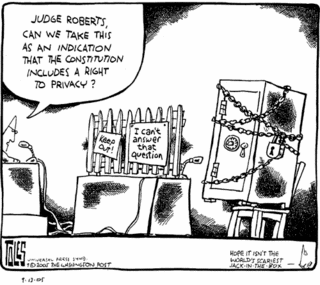
 http://seattlepi.nwsource.com/opinion/242444_roberts28.htmlRoberts' ruling on suspect troubling
http://seattlepi.nwsource.com/opinion/242444_roberts28.htmlRoberts' ruling on suspect troublingIf we want to predict how John Roberts might act as chief justice of the United States, we should study his rulings over the past two years on the District of Columbia Court of Appeals. As a federal judge, Roberts is not beholden to the executive branch but can voice his own interpretation of the laws and the Constitution.
Unfortunately, his judicial record reveals an expansive view of presidential power in tension with fundamental human rights.
Shortly before President Bush nominated him to the Supreme Court, Roberts joined two of his colleagues on the D.C. bench in a ruling that
frees the government from almost any humanitarian constraint in its treatment of foreign captives suspected of terrorism. The ruling suggests that,
as chief justice, Roberts would not oppose the cruel and inhuman treatment of prisoners at Guantanamo and other detention centers located abroad.
The issue in "Hamdan v. Rumsfeld" was whether the federal government could prosecute foreign terrorist suspects in
military commissions that lack the due process protections of civilian trials and military courts martial. The newly created commissions are stacked so heavily against the defendant that they have triggered protests from defense lawyers and from military prosecutors.
Prosecutors may introduce
"secret evidence" that the defense cannot see and might even be able to use information extracted by torture. There is
no possibility of appeal to a civilian court.
Lawyers for Salim Ahmed Hamdan, a Guantanamo prisoner awaiting trial, argued that
the commissions are illegal under the Geneva Conventions. The district judge agreed, noting the Conventions' emphatic prohibition on unfair trials. This decision was reversed by Roberts and his colleagues on the appeals court. (TG: They reversed their OWN decision? And we want someone so double-minded as Chief Justice?)
The military commissions are an expedited form of justice that will lead to
convictions of innocent people. The Geneva Conventions had sought to abolish this barbaric practice. Yet Roberts perceives no legal bar to the commissions, and believes that, even if they are illegal, the U.S. court system has no right to interfere. His view comes close to depriving suspected terrorists of all rights, including the right against cruel and inhuman treatment.
Jamie Mayerfeld is associate professor of political science at the University of Washington.





















